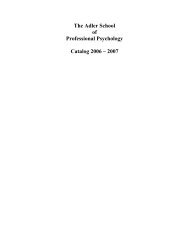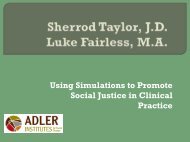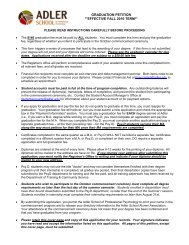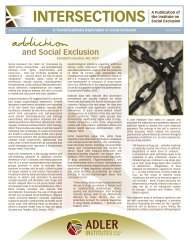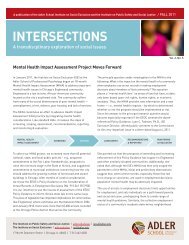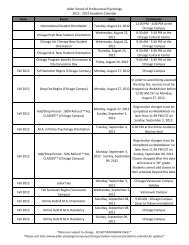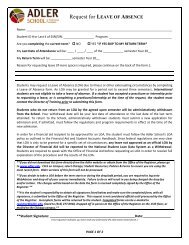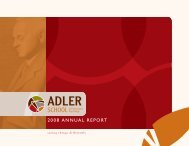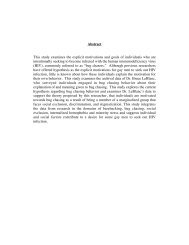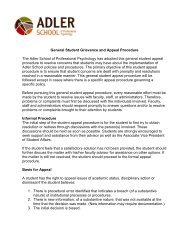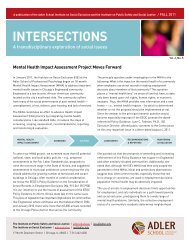Adler School of Professional Psychology Catalog 2008 – 2009
Adler School of Professional Psychology Catalog 2008 – 2009
Adler School of Professional Psychology Catalog 2008 – 2009
You also want an ePaper? Increase the reach of your titles
YUMPU automatically turns print PDFs into web optimized ePapers that Google loves.
Assessment Seminar (601-603). Students complete a minimum <strong>of</strong> 600 clock<br />
hours <strong>of</strong> clinical training that focuses on developing skills and providing<br />
experience in psychological assessment. May not be transferred or waived.<br />
614-616 Doctoral Therapy Practicum I – III 1 Credit per term<br />
Prerequisites: Doctoral Assessment Practicum (611-613) and seminars (601-<br />
603). Concurrent with Therapy Seminar (604-606). Students complete a<br />
minimum <strong>of</strong> 600 clock hours <strong>of</strong> clinical training focused on developing skills<br />
related to intervention/treatment. May not be transferred or waived.<br />
619-621 Advanced Practicum I – III 1 Credit per term<br />
Prerequisites: 611-616, Concurrent with Advanced Practicum Seminar (607-<br />
609). Students are required to complete a minimum <strong>of</strong> 600 practicum hours in<br />
order to receive credit for this training experience. May not be transferred or<br />
waived.<br />
623 Life Span Development 3 Credits<br />
Social, cultural, biological and psychological issues <strong>of</strong> prenatal life, childhood,<br />
adolescence, adulthood and aging are presented. Psychosocial development,<br />
cognitive functioning, life transitions, coping and adaptation, work and<br />
retirement, bereavement and related issues are explored. The course focuses<br />
primarily on the theories and application <strong>of</strong> normal development using a<br />
systems approach.<br />
624 Assessment III: Integrative Assessment 3 Credits<br />
Prerequisites: 627, 628. In this course, students learn to generate hypotheses<br />
from multiple sources <strong>of</strong> data. Specifically, students are trained to cross-validate<br />
interview, historical, behavioral, psychometric, and projective data; and to<br />
subsequently compose pr<strong>of</strong>essional psychological assessment reports based on<br />
these data sources. The course teaches students to (a) effectively organize<br />
data, (b) to understand the impact <strong>of</strong> personal bias and cultural factors in the<br />
interpretation <strong>of</strong> assessment findings, and (c) to communicate findings about<br />
cognitive/personality liabilities, as well as strengths and assets. Students also<br />
learn to sculpt assessment reports to respond to specific referral questions, to<br />
write cogent summaries and case formulations, and to develop effective<br />
recommendations based on assessment findings. This course may not be<br />
transferred or waived as it serves to prepare students for the Clinical Qualifying<br />
Exam (assessment portion). Must be taken with required lab.<br />
627 Assessment I: Cognitive and Intellectual Assessment 3 Credits<br />
This course introduces students to the theoretical basis, current issues, ethics<br />
and clinical use <strong>of</strong> cognitive and intelligence assessment. An appreciation <strong>of</strong> the<br />
cultural influences and diversity involving assessment procedures is<br />
emphasized. Classical and current theories <strong>of</strong> intelligence are explored.<br />
123



